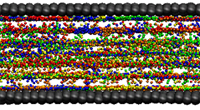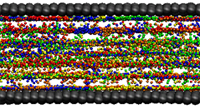Slipping By
When a liquid lubricant is confined to a small space, the energy barrier against molecular rearrangements increases causing the liquid to behave more like a solid. Understanding the frictional properties of materials on molecular length scales—the field of nanotribology—is becoming increasingly important for reducing wear on micromachined parts and improving biomedical devices.
In a paper appearing in Physical Review Letters, Ion Sivebaek, at the Technical University of Denmark in Lyngby, and his colleagues report numerical simulations that may help understand how the properties of a liquid change when it is only a few molecules thick.
Sivebaek et al. apply molecular dynamics to calculate the effective viscosity of long hydrocarbon molecules confined to a -nanometer gap between a stationary surface and a block that can slide over it. The paraffinlike molecules are between and carbon atoms in length, with the shortest molecule being roughly the length of the gap.
Experiments have shown that the effective viscosity of a lubricating layer has a power-law dependence on the shear rate. Sivebaek et al.’s simulations on alkanes confirm this relationship and predict how the friction of the molecules would evolve from being solidlike to liquidlike with increasing temperature. – Jessica Thomas





